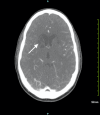Relationship Between CNS Infections, Stroke, and Neurological Complications: A Case Series
- PMID: 40062111
- PMCID: PMC11888556
- DOI: 10.7759/cureus.78558
Relationship Between CNS Infections, Stroke, and Neurological Complications: A Case Series
Abstract
Central nervous system infections and complications such as meningitis and stroke in immunocompromised patients can be caused by a wide spectrum of pathogens, including bacteria, viruses, parasites, or fungi. This case series first presents a case of a 24-year-old Latino male patient with HIV, cytomegalovirus (CMV) encephalitis, a positive CSF for Coccidioides antigen, and a stroke, who presented to the primary care office with a headache and double vision. With his symptoms now occurring for more than two months without improvement, the patient was sent to the ED for a repeat MRI, where an enlargement of his ventricles compatible with hydrocephalus was observed. This patient was diagnosed with coccidioidal meningitis and sent to a different facility for neurosurgical management. The second case describes a 28-year-old White male patient living with HIV and struggling with polysubstance use, who presented to the ED with a stroke and encephalopathy. Labs to address his underlying cause of encephalopathy showed a positive rapid plasma reagin (RPR) titer, and MRI results were consistent with bilateral acute ischemic infarcts of syphilitic vs. HIV-associated vasculitis. The patient was placed on aspirin, corticosteroids, and high-dose antibiotics. A prognosis of coccidioidal meningitis and neurosyphilis can be fatal if left untreated; as a result, this case series emphasizes the need for prompt stroke management and workup, especially in the context of infection and/or encephalopathy. Discovering the underlying cause of stroke can not only address the patient's current symptoms but also prevent future stroke occurrence.
Keywords: central nervous system infections; coccidioidal meningitis; hiv; neurological complications; neurosyphilis; stroke.
Copyright © 2025, Soni et al.
Conflict of interest statement
Human subjects: Consent for treatment and open access publication was obtained or waived by all participants in this study. Conflicts of interest: In compliance with the ICMJE uniform disclosure form, all authors declare the following: Payment/services info: All authors have declared that no financial support was received from any organization for the submitted work. Financial relationships: All authors have declared that they have no financial relationships at present or within the previous three years with any organizations that might have an interest in the submitted work. Other relationships: All authors have declared that there are no other relationships or activities that could appear to have influenced the submitted work.
Figures


References
-
- Akram SM, Koirala J. StatPearls [Internet] Treasure Island (FL): StatPearls Publishing; 2024. Coccidioidomycosis.
-
- Ha T, Tadi P, Leslie SW, Dubensky L. StatPearls [Internet] Treasure Island (FL): StatPearls Publishing; 2024. Neurosyphilis. - PubMed
-
- Giacomelli A, Antinori S. Encyclopedia of Infection and Immunity. Vol. 3. Elsevier; 2022. Fungal meningitis; pp. 323–338.
Publication types
LinkOut - more resources
Full Text Sources
